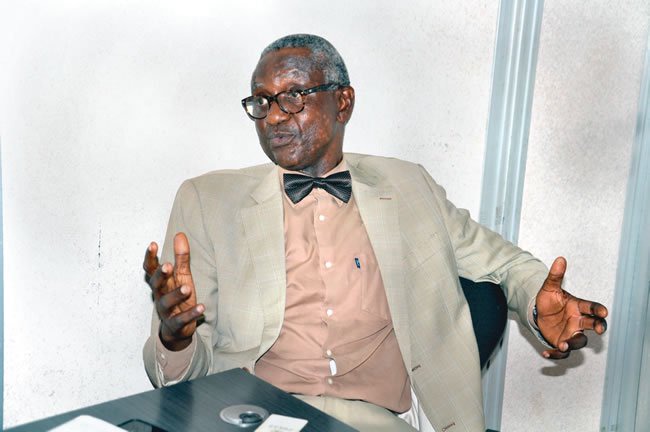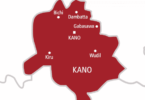
In this tell-all interview, the first son of the late Alaafin of Oyo, Oba Lamidi Olayiwola Adeyemi III, Prince Israel Adeyemi, speaks with SAHEED SALAWU about his up-close views of his father and his personal moments with him as a young child and as a grown-up. The accomplished legal practitioner also talks about what made the revered traditional ruler tick and some never-before-mentioned events that attended his final moments and eventual death exactly one year ago today.
I miss him as my father. I miss his presence. I miss so many things about him: his contribution to the traditional institution; his contribution to the state; and generally, his intellectual prowess. Kabiyesi would always talk on topical issues: politics, Yoruba race… He was a principled man. In times like this when men lack courage, Kabiyesi would speak his mind. I miss that about him. I made sure I went home once in a month, so I miss our discussions. Anytime I got to the palace, I would not leave for five hours. He would say, ‘Lawyer! I want to show you something’; ‘Read this article’; ‘This is the letter I wrote to the President. Give me your opinion’. We would discuss one-on-one, he would give me facts and figures, and generally we would just have a nice time. Those are the things I miss about him.
You are one of those who saw him last. What was his last moment like?
There are important, historical events in Oyo where Kabiyesi’s physical presence was important. Itunu Awe (Eid el Fitr) and Ileya (Eid el Kabir) are always big events. When he was going to Yidi, the praying ground, he normally went with the entourage of his chiefs but he always walked back year in, year out. You know, he liked to sing, dance and rejoice with the chiefs and all the people. So, the plan was that he would just receive treatment, he would be back and we would go to Yidi together. But man proposes and God disposes. So, I saw him last on Wednesday. On Friday night, Baba Afe called me that he had passed on.
My plan now was to get him (his body) into the palace before the news started spreading. So, I called the Bashorun (his second-in-command) and told him that Kabiyesi had passed on; ‘whatever you, chiefs, have to do, please do it’. There were rites they needed to perform. I said (to the Bashorun), ‘Just make sure everybody is available, the Chief Imam, all the Isese people. Whatever you need to do, I will pay the cost. Just make sure everything is done properly’.
Baba Afe was tremendous. The fact that a first-class Oba of his nature died in a hospital had great significance. We could not keep his body in the hospital for a long time. But thank God, Baba Afe had been of tremendous support. He was a pillar before and after Kabiyesi’s death. He was the one who organised, that night, around 12 midnight, and we brought Kabiyesi’s corpse back to the palace. There were traditional rites that needed to be performed before his corpse could be taken inside. They had to do about 21 gun salute and people who knew tradition knew that the elephant had fallen. Of course, they did some other traditional rites. Information got out but people did not believe until his death was officially announced.
You are the first child…
No, I am the first son. I had an elder sister who passed on about seven years ago. By her departure, I now happen to be the first child and head of the family.
You are how old now, sir?
By the grace of God, I will be 60 this July.
What was the earliest memory you have of your dad?
I remember when we were living in Isale-Eko, before my father became an Oba. I will give you two-three incidents that I remember very well. In the neighbourhood, I had a fight with somebody. The person beat me and I went home crying. My father told me to go back. He said ‘you are a man, you must fight and win’. I went back and beat the hell out of that person. He said, ‘I am a boxer. They know me. People have to fear you’. At that early stage, that incident contributed to my independent nature, my toughness. Then secondly, I remember vividly, I went to watch a football match with Kabiyesi. Stationery Stores FC was playing and he carried me on his shoulders in the stands. He was not yet an Oba at the time.
Was there any time that he beat you?
None that I can remember, because he always admonished me and I was really close to him.
Before he became Oba, as a prince, did you ever see him angry with somebody, or sad, and why?
Angry? On one or two occasions. Sad? If he was sad, Kabiyesi would never show it. He would just be pensive. You know, his training as a boxer had taught him to absorb a lot of pain. He went through a lot. His father was dethroned. All those things really toughened him up. He bottled up his emotions. Many a time he would just sit down and rest his chin on his hands. Now I appreciate what the man went through, the load he carried. Sad? He never showed it.
As the eldest child, do you have an idea of the number of children he had?
Well, let me just say we are many. I left home sometime in 1996. After I left home, there were other wives he married. It’s a reality for somebody like him. There are many children he had. I have not been counting. I only know the ones I grew up with.
His ascension to the throne did not end his boxing career. I will tell you why. He was a professional boxer and he never lost any bout. They called him ‘Slumber Boy’. I asked him what that meant and he said, ‘I put them to sleep’. He loved boxing. I think the reason he developed interest in boxing was what he passed through and that was the only way he could vent his anger. And he really pummeled his opponents. You know, as a young lad, he faced so many vicissitudes of life. He struggled through life. I sat him down sometimes and we talked. He was once a cook. He used to do odd jobs. He said in Isale-Eko, before a shop closed, he would stay there and when they closed, in the shop he would sleep. Those things toughened him. So, when he became an Oba, he created a boxing ring in a lush area within the palace which we call ‘Garden’. He would invite boxers to come and spar with him. The Oyo Mesi and the townspeople felt so bad about this. They wondered how somebody would be pummeling their Oba. They had to beg him to stop boxing: ‘We can’t take it, watching you, in your high esteem, getting punched. Kabiyesi, please, stop’. And grudgingly, he stopped. But when he celebrated his 70th birthday, he had a boxing exhibition, and he boxed. I was there. He organised a boxing tournament. There was a video of him which went viral. He went to Adamasingba (Sports Complex) in Ibadan to box. So, it had always been boxing but he reduced it. Ask anybody in Oyo: he would wake up early in the morning and do road work around the city centre. Because of the security implication, he stopped, but he still went to the stadium and did his boxing, his exercise.
How far would you say boxing took him as a career?
I think as a boxer, what stopped Kabiyesi’s career was that he had a taste for educational laurels. I think boxing was, kind of, a pastime. He was about to go to England to study Law when he was selected to for the throne. So, his academic pursuit stopped his boxing career, and the throne stopped his academic career. He would have been a lawyer. In most of his struggles, Kabiyesi always went by the instrumentality of the law and he never lost a case. Once I was having a discussion with Baba Afe and he said to me, ‘Do you know that your father is one of my best clients?’ He said he (Kabiyesi) made things easy by providing him with all needed documents and facts, and he would just go to court to shine. So, I think it was his academic pursuit and the issue of the throne that stopped his boxing career. He loved academics. He loved to achieve because he realised that lack of education allowed people to take advantage of any person. Even for the fact that Kabiyesi did not go to the university, if you were a professor, you had to be sound. The man would reel out facts and figures. He would quote Nnamdi Azikiwe, Obafemi Awolowo, etc
Did Kabiyesi have any premonition of his death?
He did. It was later that we learnt that he had been talking about death. In fact, he was be at a meeting where he just said that after his death, he didn’t care what they did to his body. You know, there had been a battle raging. In Ogun State, they were saying that most of these rites they perform should stop; that each Oba should have a choice as to how and where he is buried. But Kabiyesi was of the view that, ‘You are a traditional man. When you became an Oba, they performed rituals and you didn’t say no’. He said as for him, once he was gone, it would just be the carcass remaining. So, he was always talking about death. That was one of the statements he uttered. And he had already told people where he should be buried. He had already given instructions. I was told that the day he passed, he was telling everybody at the hospital, ‘We are going home! We are packing, we are going!’ And the people who were close to him knew he was going. Those kinds of people would know.
And looking back, there was one incident which indicated to me that Kabiyesi knew. On Sunday, before we picked Kabiyesi from his quarters, Baba Afe sent an ambulance, a qualified doctor and a nurse. The ambulance was fully equipped with all the gadgets. Kabiyesi was in high spirits. We ate. He had his breakfast and I prayed with him. He got into the ambulance and I called one of the Ayabas (the king’s wives) to come and stay with him. We didn’t want to create a scene and so there was only one palace security official with him. In the other vehicle that followed him were two other Ayabas. As he got into the ambulance and we were about to go and we were all cheering him up, all of a sudden, he started crying. That was the first time I saw my father cry. That was the first time in my life that I saw my father shed tears. It was after he died that I realised that the man knew that he was not coming back. So, those were the telltale signs. Those who were also close to him may have also had their own telltale signs. Kabiyesi fought many battles and he never showed emotions. Those who know Kabiyesi will tell you that he was a fighter and he never have up. If he believed in a cause, he would fight it to the end. Looking back now, I know the man was saying goodbye to us.
What kind of relationship did you have with your father’s wives, your mother’s co-wives? Many of the other wives, he married late in his lifetime and some of them are even young enough to be your own daughters.
I always marvel at how he managed to synergise. To operate in a family with so many wives and children takes wisdom. When I was growing up in the palace, of course, as children, there were issues but because Kabiyesi maintained discipline and order, he did not allow whatever differences we had to escalate. But as the first son, they (the king’s wives) accorded me due respect, as their ‘husband’. The respect was mutual. The new wives he married at the latter stage of his life gave me respect and I also respected them. Despite the fact that I was old enough to be their father, I used ‘e’ (a Yoruba pronoun that symbolises respect, especially for an older person) for them. So, the respect was reciprocal. Mind you, I was respecting my dad and the institution. Whatever respect I could accord the Alaafin, my father, I accorded his wives, no matter their age.
How are they faring now?
In fact, Sunday last week, my siblings and I and the Ayabas had a meeting. We carry them along. We all miss him. You know, Kabiyesi was the Alpha and Omega. He provided for all of them. For example, this Itunu Awe (Eid el Fitr) Festival, he would have given every one of them goats and foodstuff. My mum (Alaafin’s first wife) is yet to get over her husband’s death. At times like this, she would be singing his praise. This morning, she said, ‘Atanda! Ma sun l’orun o’. You know, he had been their all. He provided all their needs. In fact, a lot of people are missing him.
What kind of friends did Kabiyesi have?
He was friends with the mighty, the medium and the low. Kabiyesi had friends cutting across divisions. You know, Kabiyesi was a simple man. He could relate with anybody and that is why his people loved him. It is two ways, really: those who loved him loved him with their lives, and there were those who hated him for one reason or another. He related with the people according to their levels. He related with everybody but he was at home with intellectuals. He enjoyed his relationships with the people, and he loved intellectual debates. He was a people’s person.
In what remarkable ways do you think Kabiyesi changed his domain, Oyo?
Let me start from the institution of the Alaafin. Oyo had only one institution that attracted attention to the town. Kabiyesi raised the bar by bringing back the lost glory of the Alaafin. The majority of his struggles had to do with the Alaafin. He brought back the lost glory of the Alaafin and put the Alaafin where he belongs. The Alaafin is now talked about all over the world. He brought back respect to the institution of the Alaafin and its chieftaincy. When Kabiyesi appeared in public, his dressing and aura were splendid. So, in terms of the institution of the Alaafin and its chieftaincy matters, he brought dignity, order and discipline, unlike what is happening now in some places. It pains me when I see how the traditional institution is being bastardised. During his lifetime, Oyo witnessed a lot of infrastructural development. Because of his love for intellectual development, he attracted educational institutions like the Federal College of Education (Special), Federal School of Survey and Ajayi Crowther University to Oyo. The rate at which Oyo was developing in its nooks and crannies during his time was amazing. His contributions in other areas such as sports will also be missed. In fact, traditional rulers are missing his contributions. Is it national discourse? Towards the latter days of his life, he was now more interested in Yoruba. The last ritual he performed was giving (Senator Bola) Tinubu his blessings. He invoked the spirits of his fathers, saying the Yoruba were not going to be relegated. He fought for true federalism. He wrote many articles on that issue. So, in that area, the Yoruba have lost a voice.
What are your plans to immortalise him?
I believe the best way to immortalise him and preserve his legacy is through academic activities. Kabiyesi was a lover of intellectual pursuit. I have instituted a lecture. It will be held annually. The first in the series, apart from other activities that have been lined up, is coming up on May 12, where members of his intellectual circle will talk about his time and reign. We are also looking at a foundation. I want to get people who believe in his ideology, a kind of a think-tank, and see ways we can keep his memory and his works alive.
The throne has been vacant for a year now. Are you not worried?
Kabiyesi has brought glamour and respect to the throne. As of the last time I heard, about 300 people were interested. I think it is normal for a highly respected throne like that. It took my father three years before he ascended to the throne. The throne of the Alaafin is not a small thing. The earlier the matter is resolved the better but this is expected. I had the opportunity of telling the Oyo Mesi, the kingmakers, when Governor Seyi Makinde visited the palace, that our father had raised the bar and they should not look at money but choose the best candidate. There are traditional means of doing it, but there are a lot of political interests. When my father wanted to become the Alaafin, the Oyo Mesi stood firm, saying, ‘This is the man we are going to choose. He is the most qualified’. Money did not play any role in their choice of the Alaafin. For choosing the right candidate, look at what Alaafin Lamidi Olayiwola Adeyemi has done for the institution. He was not perfect but at least, he has left something that we can be proud of.
The problem we are having with the traditional institution is that the candidates that are qualified are not chosen. There are political interests. There are pecuniary interests. But at the end of the day, who suffers? The institution, the society. So, I am appealing to the Oyo Mesi and the powers that be to do the right thing and choose the right person.











Leave a Comment